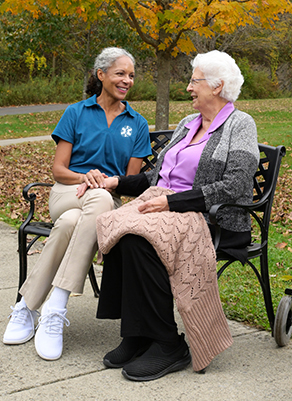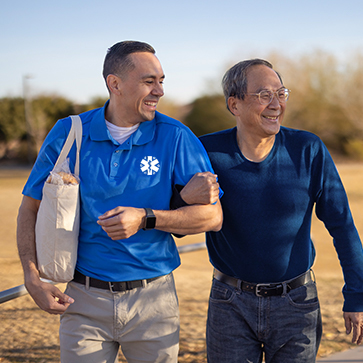End-of-Life Care
When your loved one is approaching the final stages of life, you’ll want to make the most of the precious time left by sharing memories and expressions of love.

Alzheimer’s Care
Companion Care
Dementia Care
End-of-Life Care
Fall Prevention
Palliative Care
Personal Care
Respite Care
Day Care
Transitional Care
Contact Us About Our Home Care
Call +389 77830164 or fill out the form below.
By submitting this form, I agree to be contacted by Assistive Center via call, email and text. To opt out, you can reply 'stop' at any time or click the unsubscribe link in the emails. Message and data rates may apply. Learn more on our Privacy Policy page.
Assistive Center offers professional, non-medical assistance for individuals during the end-of-life phase. Our compassionate palliative care services will keep your loved one comfortable and at peace. Although the program does not include hospice care, an expert caregiver will provide comfort and relief assistance that complements hospice services. We’ll support you and your family whenever needed.
Our dedicated caregivers will also give you peace of mind by managing your day-to-day caregiving responsibilities, letting you focus on what matters most—your loved one.

Non-Medical End-of-Life Services
Assistive Center trained caregivers will follow a personalized plan to create a soothing and relaxing environment for your loved one, ensuring comfort and dignity during the final stages of life. They'll provide emotional support, assist with daily activities, and offer devoted companionship, all tailored to specific needs and requests.
We’ll be beside you to offer companionship, emotional support, and spiritual connection. If you need a break or breather, Assistive Center can provide respite care – or temporary relief – while your loved one receives support.
We’ll work with their care professionals to deliver the following personal home care services:
- Bathing
- Comfort care
- Grocery shopping
- Hospital-to-home transition
- Laundry
- Light housekeeping
- Meal planning
- Meal preparation
- Repositioning and transitioning
- Toileting
Getting Started with End-of-Life Care
While we do not provide medical services, our management team communicates with hospice care professionals to provide essential services to support your family through your loved one’s final days.
Contact your local Assistive Center home care office to discuss end-of-life services.

Frequently Asked Questions
When a loved one has a limited life expectancy due to a terminal illness or other cause, they often require non-medical care to improve their quality of life and well-being during their final days, weeks, or months. It focuses on ensuring they are comfortable and not in pain during their final days. In many cases, day-to-day personal care responsibilities fall on the shoulders of family and friends.
Sometimes, it is too difficult for relatives and close friends to manage the physical and emotional demands on their own. Professional end-of-life care services are a shared resource — and Assistive Center can help.
Non-medical care can occur at home, in a hospital, or a specialized hospice facility, depending on the individual's needs and wishes.
End-of-life care helps people facing serious illnesses by managing symptoms and providing support, aiming to improve their quality of life during their final stages.
Hospice is a type of end-of-life care that focuses on comfort and dignity for patients with terminal conditions. It is often delivered at home or in a hospice facility. Unlike general end-of-life care, hospice doesn't pursue treatments to cure the illness. Instead, it focuses on easing pain and supporting emotional needs during the final stages of life.
Through a specialized coordination-of-care system, Assistive Center works closely with hospice providers, shares care goals, and communicates about an older adult’s condition.
Yes, our caregivers receive non-medical care training on the stages of death and dying, which helps us support you and your family. They receive training on what to do if an older adult passes away while under their care. This comprehensive training outlines specific protocols and enables them to respond compassionately while helping the family through the next steps.
Our caregivers serve as “eyes and ears” for families and will keep a watchful eye for changes that warrant intervention beyond non-medical attention. In-home assistance can also reduce “caregiver burnout.” A professional caregiver will take on difficult care tasks, complete day-to-day errands and chores, and provide you with respite when you need a break.
Each of us, regardless of our health, should communicate our end-of-life wishes with our family. The best time is before a terminal illness is diagnosed. If your senior is approaching the end-of-life stage, our care coordinators can meet during a free, no-obligation consultation to discuss your loved one’s personal care needs.
